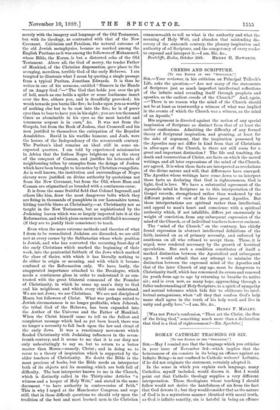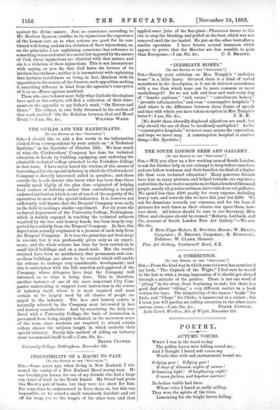ROMAN CATHOLIC TEACHING ON SIN.
[To THE EDITOR OF THE "SPECTATOR."]
Sin,—May I remind you that the language which you criticise in your issue of November 3rd—which implies that the heinousness of sin consists in its being an offence against an Infinite Being—is not confined to Catholic writers? Leibnitz, if he did not originate the statement, certainly adopted it.
In the sense in which you explain such language, many Catholics, myself included, would disown it. But I would point out that Catholic theology supplies a very different interpretation. Those theologians whose teaching I should follow would not derive the hatefulness of sin from the fact that God detests it ; but they would consider that as the nature of God is in a mysterious manner identical with moral truth, as God is infinite sanctity, sin is hateful in being an offence
against the divine nature. Just as conscience, according to Mr. Herbert Spencer, testifies in its injunctions the experience of the human race as to what actions are good for its con- tinued well-being, and sin is a violation of these injunctions, so, • on the principles I am explaining, conscience has reference to something transcendental, to a moral law imposed by the nature of God, whose injunctions are identical with that nature, and sin is a violation of these injunctions. This is not inconsistent with saying, as you do, that God hates sin because of its intrinsic hatefulness ; neither is it inconsistent with explaining that intrinsic hatefulness as being, in fact, identical with its opposition to the nature of the Creator, such opposition making it something different in kind from the agnostic's conception of it as an offence against mankind.
Those who care to know more fully what Catholic theologians have said on this subject, will find a collection of their state- ments in the appendix to my father's work, "On Nature and Grace." The subject is also fully discussed in the section of that work entitled "On the Relation between God and Moral







































 Previous page
Previous page